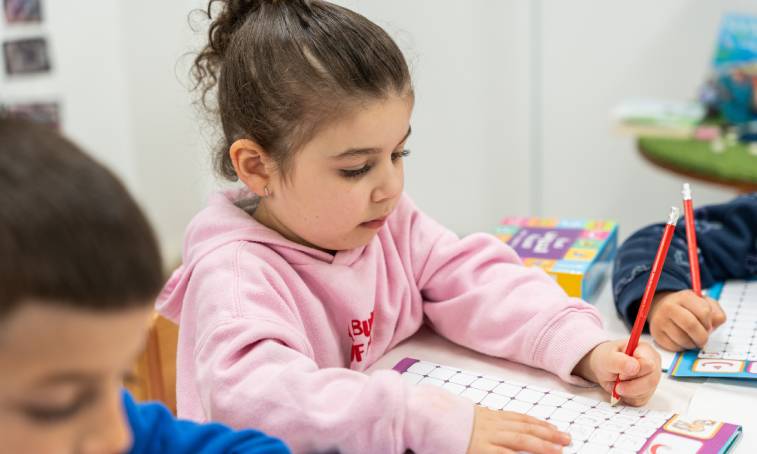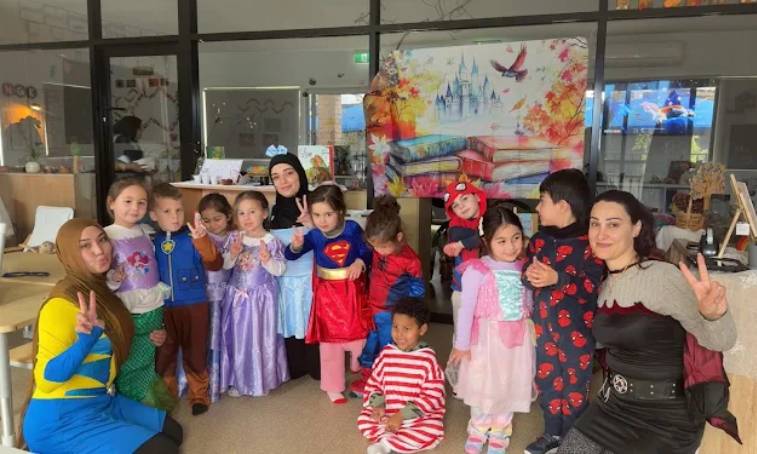Picking the right daycare is a big decision; every parent wants their child to feel safe, happy, and grow strong.
But questions creep in: “Will they make friends?” “Is this helping them learn?” That worry can weigh heavily.
It’s normal to wonder about the effects of daycare on child development psychology, especially with so much advice flying around. From separation anxiety to social growth, there’s a lot parents carry while trying to do what’s best.
At Next Generation Kindergarten, we truly get what’s on your heart because many of us are parents too. We’re here to support families like yours with quality care that builds confidence for both you and your child.
Cognitive and Academic Foundations in Daycare
Understanding how daycare nurtures a child’s thinking and learning abilities gives parents insight into the lasting effects of early education. Let’s explore how these foundations take shape in daily experiences.
Mental stimulation and structured learning environments
Walking into a warm, inviting classroom buzzing with curious little minds is where meaningful learning begins.
At Next Generation Kindergarten, children learn through play-based sessions balanced with a daily structure that gently guides them. Routines help them feel secure while boosting memory, concentration, and thinking skills.
With our visual arts, movement activities, and nature exploration programs, the day becomes full of wonder and discovery – naturally encouraging mental growth every step of the way.
Literacy and numeracy readiness in the preschool years
When children sing counting songs or recognise their name in print during activities, they’re building essential early skills. Through our School Readiness Program, we introduce friendly literacy and number concepts in playful ways.
Matching games, storytelling, and hands-on materials support school readiness. Kids don’t even realise they’re learning – it feels more like fun with friends. This smooth progression gets them confident for the big school changes coming next.
Influence of early educational frameworks like EYLF
The Early Years Learning Framework (EYLF) shapes our curriculum, making sure each child becomes a confident communicator and learner. It’s not about ticking boxes – it’s about meaningful outcomes.
Our educators connect each child’s interests with goals that support communication, well-being, and a sense of belonging. By capturing everyday moments as learning stories, we keep education flexible, personal, and perfectly paced for growing minds.
Emotional and Social Growth in Early Childhood

Just as cognitive skills form the building blocks of learning, a child’s emotional security and social confidence are equally vital. In daycare settings, these experiences shape resilience, empathy, and the ability to connect with others.
Development of empathy and cooperative behaviour
Kindness grows when children listen to each other’s stories or help a friend build a block tower again. In our family-grouped setting, older and younger children interact daily.
Watching and helping one another fosters learning empathy and encourages taking turns. Educators guide these social moments gently, promoting understanding through simple acts such as sharing, supporting, or simply sitting close.
Group settings and interpersonal conflict resolution
Squabbles happen – but so do powerful lessons. Whether it’s toy disagreements or group game frustrations, our team steps in with calm support.
Children learn to use words, read body language, and practice calming down. These moments teach far more than just getting along – they develop essential skills for friendships and emotional balance later in life.
Emotion regulation and early self-awareness
Feelings can feel big when you’re little. Our educators help children name their emotions, pause when upset, and celebrate small victories. Yoga stretches, quiet corners, or simple breathing games offer tools they can use anytime.
Over time, children recognise what they’re feeling and discover peaceful ways to deal with it.
Long-Term Psychological Effects of Daycare
Beyond the early years, the effects of daycare on child development psychology continue to unfold, influencing how children think, feel, and interact well into their school years and beyond.
Emotional intelligence through sustained peer engagement
Regular time with peers builds social awareness, patience, and confidence. Over months and years in care, children begin noticing others’ feelings more naturally.
They respond with comforting words, hugs, or playful jokes. These shared experiences become the roots of emotional smarts that follow into school and beyond.
Behaviour regulation and external influences
Children pick up routines when those around them model clear, respectful behaviour. In our centres, guidance and structure help them understand what’s expected while offering room to choose.
Predictable rhythms, mixed with warm communication, gently bolster behaviour regulation grounded in understanding – not fear.
Impacts on resilience and problem-solving ability
Trying something and failing, then trying again – it’s all part of learning. From puzzles to peer play challenges, our environment encourages safe risks.
Children who attend daycare gain practice in bouncing back, adjusting, and thinking through what works, a quiet habit that becomes a lifelong resilience.
Evolving personality traits linked to early daycare exposure
In our diverse and joyful settings, children develop traits like openness, confidence, and adaptability. Interacting with people from diverse cultures and personalities daily encourages tolerance and curiosity. By the time they head to school, they’ve already grown into brave little individuals capable of voicing opinions and exploring ideas.
Comparing Home Care and Daycare Influence
While every family weighs the comforts of home against the structured opportunities of daycare, understanding how each setting shapes growth highlights the unique role both play in a child’s development.
Cognitive and social development under primary caregivers
Home care creates deep bonds and a familiar rhythm, yet group daycare adds layers children might not see at home. Discussing with peers, following class rules, and engaging in group games all foster broader thinking and more inclusive communication. Together, they complement each other beautifully.
Transition challenges between home and centre environments
Moving between home and daycare can feel bumpy at first. We soften these moments through warm welcomes, consistent routines, and honest chats with families. This gentle bridging helps little minds feel safe, wherever they are.
Mixed-age group effects and sibling-like bonding
At Next Generation Kindergarten, our family-grouped setup mimics a big family. Older kids help younger ones, fostering bonds similar to those found in sibling dynamics. This nurtures understanding across ages and builds patience and pride that enrich both learners.
Benefits of consistent routines across settings
Consistency helps toddlers know what comes next. When home and daycare routines line up – nap times, meals, even songs – it’s easier for children to adjust, behave predictably, and take in new learning.
Play-Based and Creative Development Opportunities
Alongside academic and social growth, the effects of daycare on child development psychology are powerfully seen in play, where imagination, creativity, and discovery become the foundations of lifelong learning.
Exploration and discovery through guided play
Whether making mud pies in the outdoor kitchen or finding snails under garden leaves, our programs create space for curiosity. Guided play means children explore freely, with a gentle adult hand guiding when needed. It taps into creativity and naturally sparks questions.
Artistic, musical, and tactile learning experiences
With singing circles, paint trays, and clapping rhythms, our day is full of sensory joy. Musical instruments and art corners let children express what they can’t yet say in words. Their masterpieces aren’t about neatness – they’re stories in colour, sound, and movement.
Fostering imagination and open-ended play
From building rocket ships out of cardboard to holding bug tea parties in the garden, creativity grows without limits. Open-ended play enables children to invent their own stories, fostering stronger thinking and communication skills over time.
Physical and Environmental Influences
The effects of daycare on child development psychology are shaped not only by relationships and learning, but also by the physical spaces children explore and the daily routines that nurture independence, health, and respect for the environment.
Safe exploration in indoor and outdoor play
Our renovated spaces offer both safety and excitement – climbing zones, nature gardens, and sun-safe play areas. Supervision blends with freedom, giving children the courage to test boundaries while staying protected.
Encouraging independence through daily tasks
From packing their own lunchboxes to zipping up jackets, we support self-help skills with pride. These small wins build big confidence. Tasks like sweeping after meals or choosing their outfit for water play make kids feel capable and trusted.
Environmental education and sustainability practices
Gardening days, recycling games, and water conservation teach children how to care for their world. We naturally embed eco values, helping kids develop care and action for the environment beyond books and posters.
Hygiene protocols and physical well-being programs
Regular cleaning, handwashing routines, and visits from healthcare professionals help ensure children stay healthy. Combined with movement and nutritious meals, these habits shape lifelong wellbeing.
I Just Want to Know They’re Okay” – Every Parent’s Quiet Wish
Somewhere between early drop-offs and late pick-ups, a quiet question lingers – are they happy, safe, growing? That answer, over time, becomes clearer as routines settle and little voices bring stories home. What once felt uncertain begins to feel right.
Children thrive where connection meets consistency. A space where learning feels like play, and every giggle carries a lesson. That’s the balance families look for and deserve. The right environment respects your worries while meeting your child’s needs.
At Next Generation Kindergarten, we create that place – where development, care, and heart live together. Book a tour today and see what peace of mind looks like.





